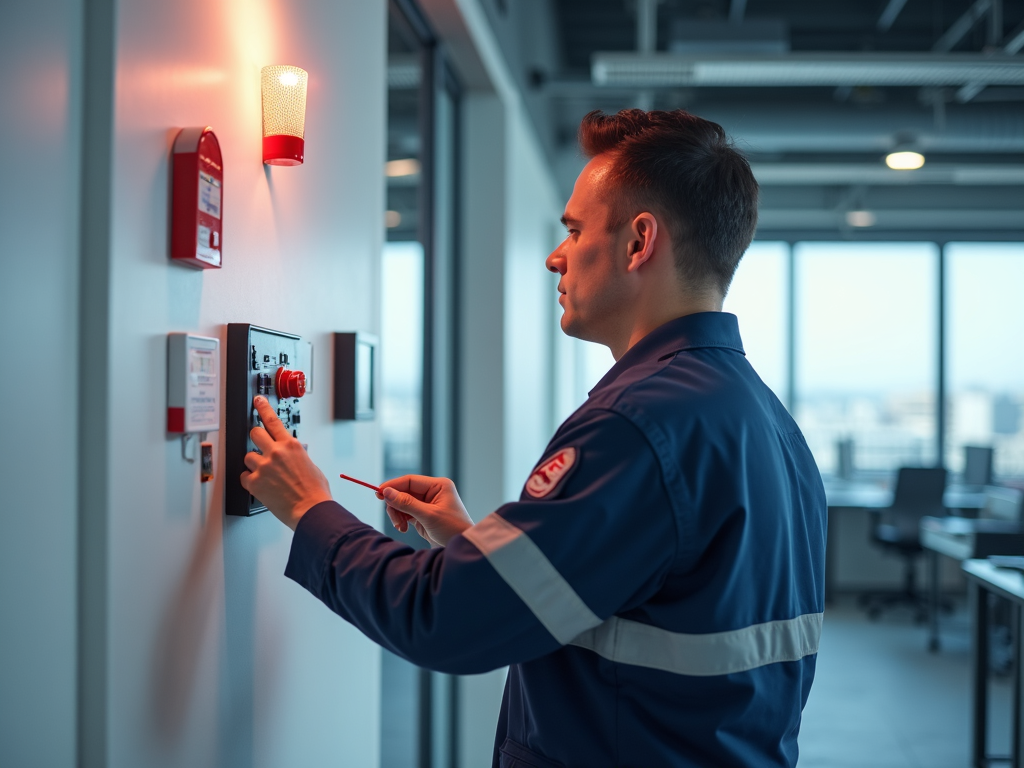
Have you ever thought about what would happen if a fire broke out at your workplace? It’s a serious risk that every business needs to be prepared for. Fire alarm systems do far more than just sound a loud warning. They protect lives, secure property, and keep operations running smoothly.
Understanding why fire alarm systems are essential is the first step towards making a safer business environment. Let’s explore what these systems do, how they work, and why investing in the right one can save you from disaster.
How Fire Alarm Systems Work
At their core, fire alarm systems are designed to detect smoke, heat, or flames quickly and alert everyone inside the building. They combine several components:
- Detectors, which sense smoke or heat and trigger the alarm
- Control panels, the brains of the system that manage signals and alerts
- Alarm devices, like sirens or strobes that warn occupants
- Communication links, which can notify emergency services automatically
These parts work together seamlessly. When a detector picks up signs of fire, it sends a signal to the control panel, which then sets off alarms throughout the building. Sometimes it also calls emergency services directly, cutting precious minutes off the response time.
Different Types of Fire Alarm Systems
Not all fire alarm systems are the same. Different businesses require different setups based on size, layout, and risk level. Here’s a quick overview of the main types:
Conventional Systems
These divide the building into zones. When an alarm goes off, it identifies the zone where the problem started but not the exact detector. They are usually simpler and more affordable, suitable for smaller buildings.
Addressable Systems
More advanced and precise, these systems pinpoint the exact location of the triggered detector. This makes it easier for emergency responders to identify the source quickly, which is crucial in large or complex buildings.
Wireless Systems
Wireless fire alarms are flexible and quicker to install because they don’t need extensive wiring. They are great for older buildings or places where running cables would be difficult.
Legal Requirements and Standards
Every business must comply with fire safety laws and regulations. Fire alarm systems are often a legal requirement, with specific standards that must be met to ensure effectiveness. Compliance not only avoids fines but also reduces liability and boosts employee confidence.
Regular maintenance and testing of fire alarm systems are usually mandated by law. This ensures that everything works perfectly when it counts, without any unexpected faults or failures.
The Business Benefits Beyond Safety
It’s easy to think fire alarm systems only protect people. But their value stretches beyond that.
Protecting Property and Assets
Fires can cause catastrophic damage to buildings and equipment. An early alarm means quicker response times, reducing the potential destruction and the cost of repairs or replacements.
Minimising Downtime
When a fire breaks out, operations often come to a halt. An effective alarm system helps contain the situation faster, allowing the business to resume normal activities sooner.
Insurance Advantages
Insurance premiums often reflect the safety measures a business has in place. A well-maintained fire alarm system can lower premiums and make claims easier to process.
Building Trust
Employees, customers, and partners want to know their safety is a priority. Investing in reliable fire detection sends a clear message that the business cares.
What to Consider When Choosing a Fire Alarm System
Selecting the right fire alarm system isn’t just about cost. Several factors need to be balanced to ensure the best fit for your business.
- Size and Layout – Large, complex buildings usually need addressable systems for precise detection. Small shops might do well with conventional systems.
- Type of Business – High-risk industries like manufacturing or restaurants might require specialised detectors that sense specific hazards.
- Building Age and Structure – Older buildings may benefit from wireless systems due to installation constraints.
- Budget and Maintenance – Initial costs and ongoing maintenance fees vary between systems and need to be factored in.
Keeping Fire Alarm Systems in Top Shape
Having a fire alarm system is just the start. Regular maintenance keeps it ready for action.
Key steps include:
- Routine testing to make sure alarms and detectors work correctly
- Replacing faulty or outdated parts as soon as issues appear
- Updating software or system components for the latest safety features
- Training staff on what to do when alarms sound
Routine checks reduce the risk of false alarms, which can disrupt business and create complacency among employees.
Beyond the Alarm: Fire Safety Culture
Technology only works if people know how to respond. A strong fire safety culture within a business improves the overall effectiveness of fire alarm systems.
It includes:
- Clear evacuation plans and regular drills
- Staff training on recognising fire hazards
- Communication protocols during emergencies
When everyone understands their role, the fire alarm system becomes part of a broader safety strategy that can save lives and property.
Fire Alarm Systems Protect More Than Buildings
Every business faces risks, but fire is one of the most devastating. Installing and maintaining a robust fire alarm system offers peace of mind and protection in ways that go beyond the initial alert.
Think of it as an essential safety net. It not only warns of danger but also helps prevent chaos, damage, and loss. Putting fire alarm systems at the heart of your safety strategy is a smart move that benefits everyone involved.
Safety First, Business Always
A fire alarm system is more than just a box with a siren. It’s a critical lifeline for people, property, and the future of any business. Taking fire safety seriously means making informed choices, keeping systems well-maintained, and fostering awareness at every level.
When safety and business priorities align, the risk of fire becomes something a company can manage with confidence rather than fear.



